Listen to This Article:
Working through your list of to-do’s to get a new food truck up and running? Buying your food truck and creating a menu are some of the important steps you may have to take to start your own food truck business.
But just as vital as how you operate and what you serve is where you park!
Food trucks operate all over the United States and in cities across the world. They’re in parking lots, in dedicated food truck parks, on the street, at festivals and farmers markets…the list goes on!
Use these tips for how to choose a location for your food truck to select a spot that makes financial sense and gets you customers!
What Cities Are Food Truck Friendly?
The rules and fees for operating food trucks are governed by state and city regulations. Some cities have rigorous code requirements as well as higher permitting fees, which can make it a challenge to operate a food truck business.
According to the U.S. Chamber of Commerce Foundation’s Food Truck Nation report, Portland, Denver, Orlando, Philadelphia, and Indianapolis top the list as some of the best cities for food trucks. They have fewer proximity restrictions, lower permitting costs, and fewer inspections and government procedures to follow.
On the other hand, Seattle, San Francisco, Minneapolis, Boston, and Washington, DC are at the bottom of the list as the least food truck-friendly. In Boston, for example, a food truck owner must complete 32 distinct procedures in order to start a new business. And in Washington, DC, applicants must make an estimated 23 trips to government agencies to complete all required procedures.
Then there are the fees. It can cost approximately $17,000 in fees to start a truck in Boston, compared to only $590 in Indianapolis!
But this doesn’t mean that you can’t have a successful food truck in Boston. You certainly can. Food trucks like Bon Me and Roxy’s Grilled Cheese & Burgers are local favorites that have thrived and expanded into fleets of trucks with multiple locations.
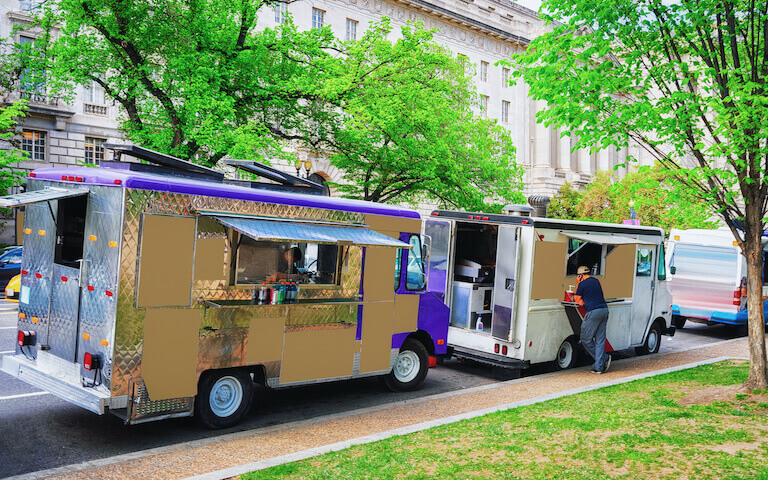
Cities like Boston and Washington, DC (pictured) have more regulations governing food trucks than cities like Portland and Denver.
Where Can You Park a Food Truck?
Once you’ve chosen your city, you have to narrow down your location options. And there are many to choose from!
Some trucks choose to have a home base where their truck stays most of the time. Others build frequent moves into their business model, following events and foot traffic across the city. Here are some options to consider as you decide where to park your truck.
Food Truck Parks
Once concentrated in food truck-friendly cities like Portland and Austin, food truck parks can now be found in cities across the country.
These sites could be long-term homes. Trucks can stay parked overnight, so owners don’t have to move around unless they choose to. Plus, a variety of trucks all in one place can be an attractive draw for groups of diners, letting everyone get something different.
Park owners may also do their own independent marketing, helping to spread the word about all onsite trucks. And they may offer onsite parking for your customers.
If you’re considering a park, assess the competition. A truck that makes delicious Vietnamese food may want to avoid a park that already has another Vietnamese truck. But if there’s a pizza truck, a wing truck, and a fried chicken truck in the lot, your Vietnamese food may stand out.

Food truck parks can attract large crowds.
At Office Parks and Medical Campuses
Office parks and medical campuses could have hundreds or thousands of employees working on a daily basis. And they may crave variety in their lunch options. A popular food truck that comes by at noon each day could provide a welcome respite from the hospital cafeteria or the sack lunch.
In Residential Areas and Parking Lots
Some residential areas may allow temporary parking for food trucks. This will probably require permission from the local HOA or apartment association.
On the Street
Food trucks that park on public streets can get excellent foot traffic. If you can secure a spot in a business district (by day) or a bar district (by night), you could see hundreds of people passing by in the span of a couple of hours.
Street parking often requires city permitting, so make sure you know your local rules before posting up.
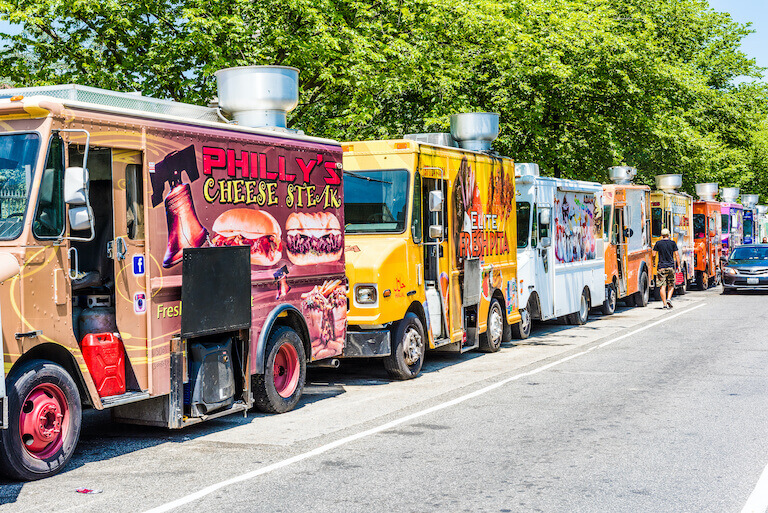
Street parking often requires city permits, so check your local rules!
At Construction Sites
A single high-rise building under construction could have dozens of people working on it at once. And come lunchtime, they’re hungry. If you can park outside a busy construction site, you could access all of those workers—plus any other nearby foot traffic.
At Farmers Markets
Farmers markets are a popular weekend morning spot for food trucks. People enjoy getting a hot meal while they roam the stalls and do their weekly shopping. Some farmers markets create a festival vibe with live music and entertainment, which can attract larger crowds.
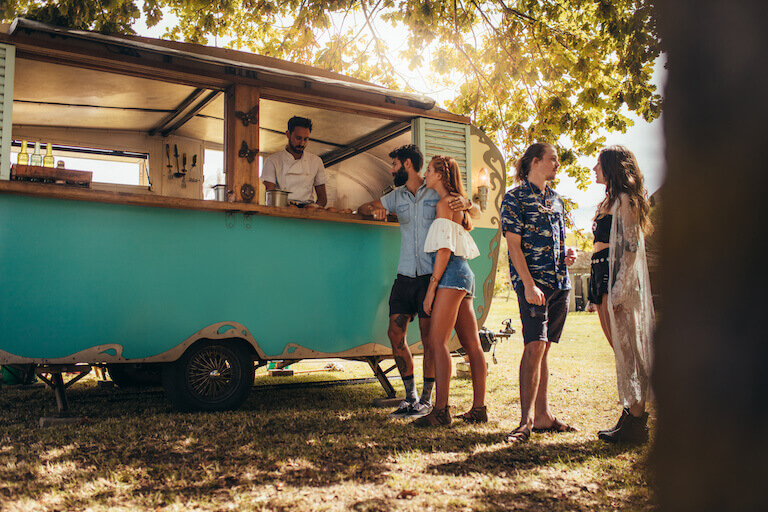
A farmers market can be a popular site for food trucks, especially if you serve coffee and breakfast food.
Near Bars, Nightclubs, Breweries, and Wineries
Anywhere that people are imbibing alcohol, there will be a market for food. Whether you park on the street outside a bar district or work out a deal with a brewery or winery owner to park long-term on their property, providing food to revelers can be a wonderful source of income.
At Festivals and Events
Large festivals and events are often served by food trucks. In Austin, for example, the Austin City Limits and South by Southwest festivals can be major events for food trucks. Trucks must usually apply and be approved in advance in order to participate.

Festivals and community events are hotbeds of food truck activity!
Outside Gas Stations
Gas stations can be successful locations for food trucks. They already have some parking, and they are a frequent stopping place for people throughout the day. Add a picnic table or two and a pop-up tent to give people a comfortable place to sit while they eat.
On College Campuses
Wherever there are young people, food trucks are sure to follow. If you can get permission to park on a college campus, you may be able to benefit from students passing back and forth between classes during the day and coming back from parties at night.
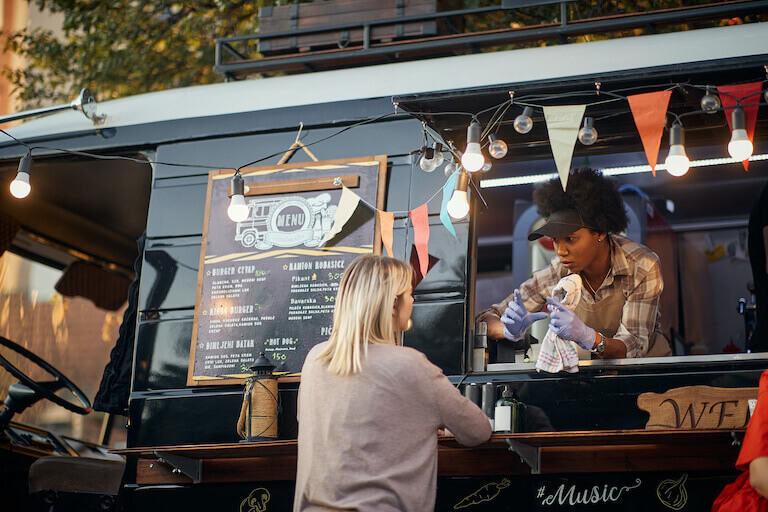
Young people love food trucks, so a college campus could be a prime location!
How to Assess Possible Locations for Your Food Truck
So with all those options in mind, how can you choose a location for your food truck? Answer the following questions to help you narrow down your choices, and see which locations fit best into your business plan.
Can You Get Permission To Park There?
The first question must be: Is that location even a possibility? In some cities, food truck placements are restricted by proximity to other businesses, especially restaurants. They may also be required to park a certain minimum distance from schools, residential buildings, and/or festivals (unless you have a special permit to serve food at the event).
In Minneapolis and Washington DC, there are 22 different location restrictions to comply with. So make sure to check with your city authority to assess the rules in your proposed parking space.
How Much Foot Traffic Is In The Area?
Food trucks often get much of their business from passing foot traffic. Part of the business model could be attracting customers off the street who want something quick and delicious.
Now, this is not always the case. For example, some food truck parks are located further from the city center and have parking available for customers, so they’re less reliant on pedestrian traffic.
But if you want to attract passers-by, you’ll need to have an idea of the foot traffic in the area. You may be able to access this information by reaching out to your city government. They may have an economic development department or a similar agency that monitors foot traffic in certain districts.
There are also private companies that may have data that you can access. Or you can simply sit at the site and count people during the hours you’d like to be open!

More foot traffic could mean more customers for your truck.
Does The Area Have The Clientele You’re Trying To Attract?
Having people nearby is great, but are they the right people?
You may find a great spot in the local business district where you’d like to park your truck. But if you’re serving playful ice cream and other frozen desserts, that may not be the right place for you. You may have better luck near a popular family park or even on a college campus than in a financial district full of three-piece suits and power lunches.
How Much Is the Rent or Parking Fee?
A spot may have great foot traffic, but if the fee to park there is thousands of dollars per month, it may not make financial sense to book it.
Do the math. How many customers would you have to serve to cover the cost of that expensive parking spot…plus all of your other monthly expenses? If the numbers add up, great! If they don’t, you might want to keep looking.
How Often Do You Want To Move Your Truck?
You may post up in a food truck park and stay there long term. Or you may head to an office park for weekday lunches, a street spot at dinner time, and a farmers market on weekends. Moving your truck frequently does take work—you have to make sure all cooking equipment and ingredients are well secured before you turn on that engine! Plus, you may need permitting for each city and/or zip code that you operate in.
If you move around, make it easy to find you! Use Twitter, Instagram, or other social media to share your truck’s daily location with followers.

Some food trucks move frequently, while others stay mostly stationary.
Is There Easy Customer Parking Nearby?
If you hope to garner to-go sales, it may be helpful to have easy parking nearby for delivery drivers or customers, so they can park to pick up their food. To-go food can be a big income stream for food trucks!
When Will Your Food Truck Operate?
Your hours of operation can be a major factor in where you park your truck. If you like late nights, you’ll want to find a bar district or an area near nightclubs—a place where people want to eat after hours.
If you’re banking on lunch, you’ll want to be near offices, colleges, or other tourist attractions—places where people are walking around midday.
Where Can You Park a Food Truck Overnight?
If you pay rent at a private location like a food truck park or at a bar, brewery, or winery, you may be able to leave your truck there long-term.
But what if you drive your truck from place to place, and don’t have a permanent home for it? You probably can’t leave your truck on the street overnight. And parking for commercial trucks is often prohibited on residential streets or driveways, so you can’t drive it home.
If you rent commissary kitchen space for food prep (which is required in many cities), you may be able to park your truck at their parking lot. In fact, if your commissary kitchen caters to trucks, this parking may be included in your monthly rent.
If that’s not an option for you, you may be able to pay for a spot in a paid parking facility. These could be indoor, outdoor, and even temperature controlled facilities, which could be great if you have a seasonal truck and need to park it somewhere for the winter.
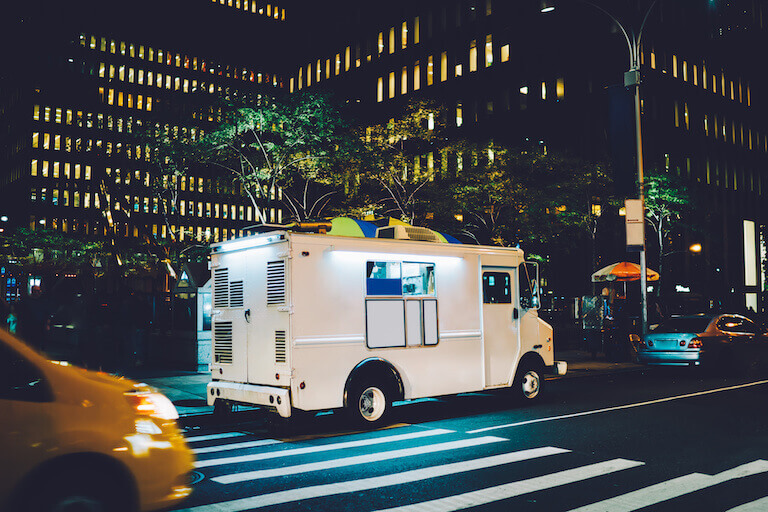
Where will you park your truck overnight?
Location Is Crucial…But It Doesn’t Have to Be Permanent!
Picking a location for your food truck is one of the most important decisions you’ll make for your business. But fortunately, your business is on wheels. That’s part of the beauty of the food truck! You want to make the most educated decision you can from the start. But unlike a brick-and-mortar restaurant, you’re not stuck with your decision for too long, and you can always make a change.
If you want to learn more about running your own culinary business, you may be interested in our Food Entrepreneurship program. With coursework in culinary fundamentals, business planning, marketing, and more, it’s uniquely designed to help future business owners to meet the challenges of entrepreneurship.
Contact our Admissions Department today for more information!
To learn more about starting your own food business, try these articles next:

